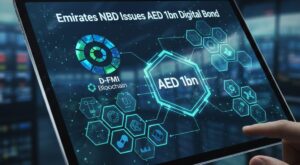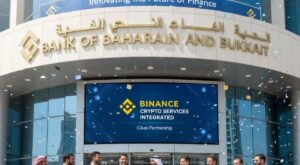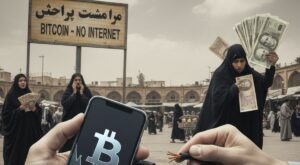Dubai- and Jakarta-based fintech Fasset has secured a provisional banking license from Malaysia’s Labuan Financial Services Authority, marking a major milestone in Islamic finance and digital banking. The approval positions Fasset to launch the world’s first stablecoin-powered Islamic digital bank—a groundbreaking model that merges blockchain technology with Shariah-compliant finance.
The new license allows Fasset to operate within Malaysia’s regulated Islamic fintech sandbox and introduce a full range of halal financial services. These include zero-interest savings accounts, stablecoin-based deposits, tokenized investment products, and on-chain global payments. Designed to expand financial inclusion, the platform will primarily serve Muslim-majority regions in Asia and Africa, where access to halal, asset-backed banking products remains limited.
Once operational, customers will be able to hold digital and fiat deposits, invest in U.S. stocks, gold, and cryptocurrencies, and spend through a planned Visa-linked crypto card. Fasset also intends to launch “Own,” an Ethereum Layer 2 network built on Arbitrum, to facilitate the settlement of real-world assets on-chain under regulated conditions. This blockchain-powered infrastructure aims to provide transparency, efficiency, and cost reduction for transactions across borders while ensuring full Shariah compliance.
Fasset’s global footprint is already notable. The company processes more than six billion dollars in annualized transaction volume across 125 countries and holds regulatory approvals in multiple jurisdictions, including the UAE, Indonesia, the EU, Turkey, and Pakistan. It has also received authorization from Bahrain’s Central Bank to pilot blockchain-based asset tokenization, obtained a Category 3 Crypto-Asset Service Provider license, and in November 2023, was granted a Virtual Asset Service Provider license from Dubai’s Virtual Assets Regulatory Authority.
Malaysia’s Crypto Landscape: A Shariah-Compliant Innovation Hub
Malaysia is rapidly emerging as one of Asia’s leading Islamic fintech centers, combining its strong Shariah governance framework with a growing appetite for digital assets. The country’s crypto market revenue is expected to reach around $484 million in 2025, with nearly 2.8 million active users—placing Malaysia among the top 50 countries worldwide by transaction volume.
Regulators are taking proactive steps to accommodate this growth. The Malaysian Securities Commission proposed significant reforms in mid-2025 to streamline digital asset trading and listings. Under the proposed framework, qualifying tokens could be listed directly on regulated platforms without requiring prior approval, provided exchanges maintain segregated client accounts and adhere to transparency standards. This reform is aimed at reducing bureaucratic delays while reinforcing investor protection.
Stablecoins, meanwhile, are becoming an integral part of Malaysia’s crypto infrastructure as regulatory clarity improves. Policymakers are exploring how these digital currencies—backed by fiat or commodities—can support cross-border remittances, enhance liquidity, and bridge the gap between traditional finance and emerging decentralized systems.
A report published by the ACCESS Blockchain Association in June 2025 projected that formalizing Malaysia’s crypto mining industry could inject RM700 million in infrastructure investment, create 4,000 jobs, and contribute RM150 million annually in tax revenue. The report also advocated for Shariah-compliant mining models that align with Islamic ethical finance principles by ensuring transparency, renewable energy usage, and equitable profit-sharing mechanisms.
The Rise of Islamic Crypto Finance Across the Middle East and Asia
Fasset’s latest move reflects a larger trend sweeping across Muslim-majority nations, where digital assets and Islamic finance are beginning to converge. Major crypto players have started launching certified halal products to cater to the world’s 1.9 billion Muslims seeking ethical investment opportunities.
In July 2025, Binance introduced “Sharia Earn,” a global multi-token staking platform certified by Amanie Advisors. The platform allows users to stake popular cryptocurrencies like Binance Coin, Ethereum, and Solana across 31 countries, including Indonesia, Pakistan, Qatar, Saudi Arabia, and the UAE. Unlike traditional staking mechanisms, it operates under a Wakala agreement structure, which ensures halal capital delegation without exposure to interest or speculative risk.
Similarly, Bybit launched its Islamic Account in September 2024, certified by ZICO Shariah and CryptoHalal. The account enables spot trading of 75 cryptocurrencies using halal-compliant mechanisms, along with automated investment tools such as dollar-cost averaging and grid bots. This initiative has expanded access for Muslim traders globally, addressing demand in the $5 trillion Islamic finance industry.
Crypto.com has also entered the Shariah-compliant arena through a partnership with Dubai Islamic Bank. The collaboration aims to introduce tokenized sukuks and other halal real-world asset products. The platform, which serves over 100 million users globally, operates under the Abu Dhabi Global Market regulatory framework and recently introduced an AED wallet for seamless local currency transactions in the UAE.
These developments highlight the accelerating pace of digital transformation within the Islamic financial system. The UAE, for example, recorded $34 billion in crypto inflows in the year ending mid-2024, marking a 42 percent increase from the previous year and a user base of 15 million across crypto applications. The broader Middle East region attracted nearly $339 billion in crypto inflows, ranking as the seventh-largest crypto economy globally.
A Call for Unified Regulation
Regional experts are urging greater coordination among Gulf countries to establish a shared regulatory framework for cryptocurrencies. Saudi economist Ihsan Buhulaiga, a former member of the Shura Council, recently called on GCC nations to harmonize crypto policies, warning that inconsistent regulations could hinder innovation and cross-border adoption.
Meanwhile, the UAE continues to advance its leadership in this sector, having recently issued regulatory approval for AE Coin—a stablecoin pegged to the UAE dirham and fully backed by domestic reserves. This move reinforces the country’s ambition to integrate blockchain technology into its financial ecosystem while ensuring monetary stability and regulatory oversight.
As digital finance evolves, Fasset’s Malaysian license represents more than a business milestone—it signals the arrival of a new global era for Islamic banking, one that fuses ethical finance principles with decentralized innovation. By bridging traditional Shariah compliance with blockchain transparency, Fasset may redefine how Muslim communities access, manage, and grow their wealth in the digital age.


























